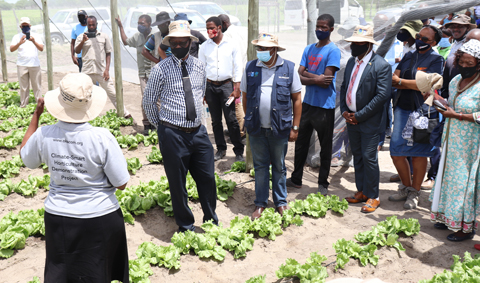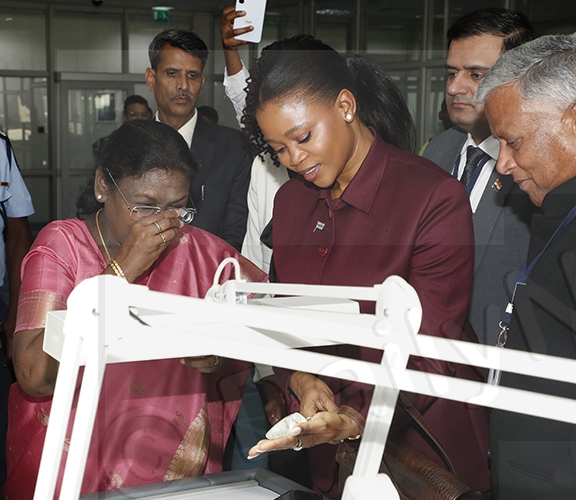Farmers appreciate OKACOM support
07 Dec 2020
Some members of Ngamiland Horticulture Growers (NHGA) Association have hailed Okavango River Basin Water Commission (OKACOM) for playing a key role in improving their production.
The members were amongst the 19 beneficiaries who benefited from the climate smart horticulture demonstration project implemented by OKACOM in collaboration with the Ministry of Agricultural Development and Food Security.
They showered OKACOM with accolades during a tour by OKACOM team to appreciate progress on implementation of lesson learned from the project.
Sharing the key lessons learnt on the demonstration by farmers, a member of NHGA, Mr Hudson Monyame revealed that since the introduction of the project, they had learnt a lot as they were actively engaged as targeted beneficiaries in the project activities planning execution.
The project, he said was viable to stimulate the economy especially in the horticulture industry. He appreciated that they learnt climate-smart practices aimed at enhancing horticultural produce.
Through the project, farmers had been assisted with infrastructure and machinery as OKACOM intended to contribute in improving socio-economic status of local communities across the basin with minimum adverse impacts and enhanced protection of the basin ecosystem.
Farmers, he said learnt smart agricultural practices, adding that before the project, farmers were using individual knowledge and understanding, purchased seeds from supermarkets and planted large numbers of seeds at one time, which mostly went to waste.
In addition, Mr Monyame noted that they cultivated crops in the open, applied fertilizers and pesticides to their best knowledge. Due to limited knowledge, he said, farmers experienced higher costs to manage extreme heat by overwatering resulting in extreme weed and pest outbreaks among others.
Since the introduction of the demonstration project and appointment of expert to offer technical know-how and a joint extension services with department of Agriculture, he said, improved their knowledge as a result of consistent mentoring.
The expert, he said drilled them in production aspects such as soil sampling to guide procurement and application of correct fertilization and pesticides administration.
Farmers, he said, were also drilled on high value intermediate seed crops varieties as opposed to open pollinated hybrid seeds as well as the importance of appropriate shade nets suitable for the local climate which facilitated production of high value crop.
Mr Monyame further appreciated that the construction of water infrastructure at the correct height enabled farmers to use gravitational flow resulting in fuel savings to pump water over long distances.
“These are complemented by the construction of ridges, application of organic matter to build soil water holding capacity and application of surface drip irrigation targeting the crop root zone. The use of ridges and drip irrigation also enabled us to eliminate overwatering, weed outbreaks,” he added.
Furthermore, it was reported that through the project, the controlled environment of farming within shade nets had enabled production throughout the season and also enabled farmers to be consistent in crop scheduling and market supplies.
Through the knowledge they acquired, Mr Monyame acknowledged that some had gone an extra mile to construct more shade nets to increase their production and reach markets.
He also noted that they had decide to share the information and knowledge with aspiring farmers adding that they wanted to train them on aspects of soil preparation, management of crops and seedling production scheduling.
Since the project would soon come to an end, he stressed the need to expand it to other farmers, noting that they should visit their farms for knowledge exchange. He also called relevant ministry to facilitate events such as field day.
Meanwhile, OKACOM team was impressed to learn that the farmers had released the benefits of farming under a controlled environment; as some of the farmers had expanded their shade nets on their own to grow more crops as initially demonstrated.
They were also informed that all demonstration farmers whose crops were at harvesting stage had been marketed to formal markets; which they were not able to meet formal markets demand despite the tourism sector being at its lowest. Ends
Source : BOPA
Author : Esther Mmolai
Location : Maun
Event : Tour
Date : 07 Dec 2020






